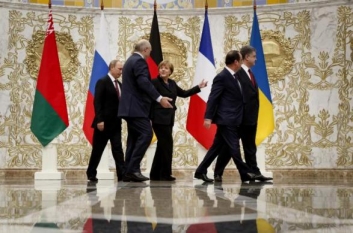Foreign policy: strengthening Belarus’ neutrality and peacekeeping reputation
 The situation has not changed
The situation has not changed

Main trends in foreign policy in 2015:
- Minsk improved its international reputation by contributing to regional security and peacekeeping activities with regard to the conflict in Ukraine
- Minsk attempted to benefit from its peacekeeping activities to normalize relations with Western capitals, while preserving the ‘alliance’ with the Kremlin
- Minsk distanced from the Kremlin’s aggressive foreign policy initiatives and attempted to take a ‘neutral’ position between the conflicting parties
- Inhibition of integration processes in the post-Soviet space because of the confrontation between Russia and the West, unilateral restrictions and counter-sanctions by the Russian authorities against Western countries and Ukraine, as well as economic downturn in Russia
Before the presidential campaign, Minsk officials made efforts to improve relations with the EU and the US, yet the main reason behind these efforts was the quest for external funding.
The need for external financing, which could help maintaining acceptable levels of incomes in the country, had prompted Belarus’ officials to settlement of relations with Western capitals. In order to remove the main obstacle hampering the normalization with the European Union, before the presidential campaign kicked off, the Belarusian authorities released all political prisoners, including the key figure – former candidate for the presidency in 2010 Mikola Statkevich.
The Belarusian officials attempted to engage additional communication channels – the Vatican, Tbilisi, Kyiv and European leaders benevolent towards the Belarusian leadership – in order to normalize relations with Brussels and warm-up Belarusian-European relations.
The participation of the Belarusian delegation in the Eastern Partnership Summit in Riga allowed Belarus to move forward with the normalization of relations with the EU:
– widen communication channel;
– fine-tune Belarus-EU agenda towards pragmatic cooperation;
– affirm Belarus’ peacekeeping reputation in the region;
– advocate for Russia on the international fora where Russia was not represented.
The normalization of relations between Minsk and the EU and the United States had not caused a sharp reaction from the Kremlin. Most likely, the Russian leadership understood that Minsk had closed opportunities for a geopolitical u-turn and would not reject Eurasian integration in favour of rapprochement with the EU.
In 2015, Minsk followed an informal convention with the Kremlin in bilateral relations and foreign policy. This model of interstate relations is based on informal conventions between senior leadership and private agreements between the heads of state.
The Belarusian authorities were no longer attracted by the Eurasian integration due to economic problems on the largest EEU market, Russia. They undertook some initiatives, including in cooperation with Astana, in order to defend the national currency and customs sovereignty vis-a-vis the Kremlin. Nevertheless, the Belarusian authorities treated the Union State as a major negotiating platform for harmonising terms of cooperation with Moscow.
The Kremlin substantially curtailed financial and economic assistance to Minsk, which was likely due to scarcity of own resources amid the economic recession in Russia. For example, a USD 3 billion loan, which Belarus had requested from the Russian-controlled Eurasian Foundation for Stabilization and Development, had not been allocated in 2015, and during negotiations the amount of possible financial assistance was scaled down to USD 2 billion.
Minsk entrenched as a permanent negotiation platform for the settlement of the conflict in the east of Ukraine. Public assessments of the situation in the eastern Ukraine by the Belarusian government were balanced, which had been approved by Kyiv and criticised by the Russian media.
In addition, Minsk demonstrated a desire for closer political, military, industrial and economic cooperation with Kyiv. In exchange for promoting Belarusian goods on the Ukrainian market, and eventually on the EU market, Belarus offered assistance in providing access to the Russian market for Ukrainian products from the sanctions list. Minsk assisted in re-equipping Ukrainian army with domestic defence industry products, provided repair services to Ukrainian aircrafts, and made efforts to establish a long-term cooperation with the Ukrainian defence industry.
Minsk officials did not expressly support the Kremlin, rather adopted a neutral peacekeeping attitude in Russian-Turkish confrontation.
Amid increasingly unpredictable Moscow’s foreign policy, Minsk took several steps in order to strengthen its positions and enhance pragmatic cooperation with the US in areas of mutual interest – for example, ensuring safe transit of NATO cargo to Afghanistan through Belarus. In addition, the Belarusian authorities sought assurances from Washington to refrain from interfering with the presidential election by funding the opposition.
Belarus’ expectations from economic and investment cooperation with China did not materialize. However, the authorities attempted to assure the population of positive perspectives from cooperation with China, such as prospects for improved well-being.
Belarus’ new attempt to revive the “long-distance arc”, i.e. to expand trade, economic and foreign policy cooperation with the African and Asian continents failed.
Amid rising tensions in the region, the Belarusian authorities attempted to adapt the armed forces to the new conditions of a hybrid war and boost the loyalty of the Armed Forces to the Belarusian state. In addition, Belarus paid close attention to national security and implemented additional measures to counter possible destabilisation of the socio-political situation in the country.
Subscribe to our newsletter




Situation in Belarus
Constitutional referendum: main consequences


 Video
Video
How to count the political prisoners: are the new criteria needed?


 Video
Video
Paternalism In Decline, Belarusian Euroscepticism, And The Influence Of Russia


 Video
Video











